How to Set Healthy Boundaries in Outpatient Treatment

Understanding Boundaries in Outpatient Recovery
Effective boundary setting is pivotal in outpatient treatment for addiction recovery. Developing these skills allows individuals and their loved ones to establish respect, protect their emotional well-being, and contribute to healthier relationships. In this article, we delve into the ways you can set healthy boundaries, their significance in recovery, and actionable advice to successfully implement them during outpatient treatment.
Recognizing the Importance of Healthy Boundaries

Defining Healthy Boundaries
Healthy boundaries are the limits that define your personal space, emotional needs, and values while respecting those of others. They protect well-being and create a framework for safe interactions in relationships, especially during recovery from addiction. Distinguishing between healthy and unhealthy boundaries is crucial; the latter can be controlling and manipulative, while healthy boundaries promote respect and open communication.
Benefits in Addiction Recovery
The establishment of healthy boundaries is immensely beneficial in addiction recovery. Setting these limits aids in:
- Improving mental health by reducing stress and preventing emotional overload.
- Enhancing communication skills, facilitating better relationships that support recovery.
- Gaining self-respect and boosting confidence, allowing individuals to assert their needs.
- Fostering healthier relationships, which is essential for long-term sobriety.
Practicing assertive boundary-setting is a key skill learned in outpatient treatment settings, where individuals often confront past behaviors and codependent relationships.
Emotional and Mental Health Impact
Healthy boundaries significantly affect emotional and mental health. They allow individuals to:
- Express their needs without guilt or fear of rejection.
- Separate their feelings from those of others, which is crucial in avoiding emotional manipulation often encountered in recovery.
- Establish self-discipline through internal boundaries, helping to align actions with personal values.
Ultimately, recognizing and maintaining healthy boundaries not only protects individual well-being but also fosters mutual respect in relationships, which is foundational for sustained recovery.
Examples of Healthy Boundaries in Recovery
Some examples of healthy boundaries in recovery include:
- Saying "no" when offered substances.
- Expecting to be treated with respect.
- Clearly stating one’s limits on physical and emotional space.
- Advocating for oneself and ensuring personal rights are respected.
By establishing these boundaries, individuals can improve their mental health and enhance their self-respect, both vital components for maintaining recovery.
The Four Cs of Boundary Setting

What are the four Cs of setting healthy boundaries?
The four Cs of setting healthy boundaries are communication, clarification, cooperation, and consistency. These elements play a vital role in establishing and maintaining boundaries, particularly in the context of addiction recovery.
Communication strategies
Effective communication involves expressing limits clearly and compassionately. This means using "I" statements to convey your feelings and boundaries without provoking defensiveness from others. For instance, saying "I feel overwhelmed when this happens" creates a dialogue rather than a confrontation.
Clarification in boundary setting
Clarification ensures that all parties involved understand the expectations set by these boundaries. This may include discussing specific behaviors that are acceptable versus those that are not, enabling everyone to align their actions with the agreed limits. Such clarity prevents misunderstandings and reinforces the purpose of the boundaries.
Cooperation in relationships
Cooperation encourages a collaborative approach to boundary setting, enabling individuals to work together to establish limits. This sense of teamwork fosters healthier relationships, ensuring that boundaries are respected and maintained by both parties involved, leading to mutual understanding and respect.
Consistency in enforcing boundaries
Consistency is crucial as it helps individuals recognize that boundaries are stable and reliable. By maintaining these limits, especially in the face of resistance or protest, one can develop an environment that promotes safety and trust in relationships. Additionally, validating emotions surrounding boundary adjustments can ease transitions, making it more acceptable for everyone involved to embrace these limits.
Boundary Setting in Patient Care

What are some strategies for setting healthy boundaries with patients?
Setting healthy boundaries with patients is essential for effective care and maintaining professional relationships. Here are some strategies:
- Define Your Limits
Understand what you can and cannot offer to patients. This provides a clear framework for your interactions. - Communicate Clearly
Use explicit and direct language to express your boundaries. Let patients know your limits, whether they involve communication times, treatment availability, or personal space. - Establish Consequences
Outline actions that may follow any boundary violations. This could include discussing the impact on your professional relationship or treatment process. - Reassess Regularly
Boundaries should be flexible enough to adapt to changing circumstances. Regularly evaluate and adjust your boundaries as necessary. - Seek Support
Don’t hesitate to consult with mentors or colleagues. Collaborating with others can offer perspectives and reassurance in managing boundaries. - Role-Model Professionalism
Demonstrate respect and professionalism in your conduct. This sets the stage for patients to reciprocate those behaviors. - Promote Open Dialogue
Encourage conversations about boundaries with patients. This fosters understanding and reinforces mutual respect.
Professionalism in Care
Maintaining professionalism in patient interactions also enhances boundary-setting efforts. This includes delivering feedback, practicing empathy, and prioritizing the well-being of both the patient and yourself. Professionalism ensures a safe environment where healthy boundaries are respected.
Managing Expectations through Boundaries
Clearly defining and maintaining boundaries aids in managing patient expectations. When patients comprehend your limits, they can align their expectations accordingly. This clarity not only contributes to smoother interactions but also bolsters the therapeutic relationship while respecting both parties' needs.
Boundary Setting Techniques in Therapy

How can you establish and communicate healthy boundaries with therapy clients?
Establishing and communicating healthy boundaries with therapy clients is essential for ethical practice and maintaining effective relationships. Therapists can implement several strategies to achieve this:
- Use Contracts and Informed Consent: Clearly outline expectations and the nature of the therapeutic relationship at the beginning. This agreement helps clients understand the parameters of their interactions with their therapist.
- Manage Time Effectively: Respect session boundaries by starting and ending on time. This ensures that clients feel valued and reinforces the importance of their time.
- Mindful Self-Disclosure: While some sharing can foster connection, therapists should be cautious about how much they reveal about themselves to maintain professionalism and focus on the client’s needs.
- Navigate Physical Touch Carefully: Since touch can greatly affect the therapeutic dynamic, therapists should address this aspect explicitly. This consideration is crucial for maintaining a safe space for clients.
- Address Social Media Interactions: Discuss any potential interactions on social platforms upfront. Clarity is key to preserve both privacy and professional integrity.
By employing these techniques, therapists can create a safe and respectful environment that enhances client well-being and fosters productive therapeutic relationships.
Types of Boundaries and Their Applications

What Types of Boundaries Exist?
In addiction recovery, four primary types of boundaries are crucial: physical, emotional, time, and internal boundaries. Each plays a significant role in protecting personal well-being and fostering a supportive environment.
- Physical Boundaries: These involve personal space and the ownership of belongings. For instance, individuals might decide not to allow substances in their home or refuse unwanted touches.
- Emotional Boundaries: Separating one's feelings from others’ is essential. This can include not absorbing blame from loved ones or resisting emotional manipulation, which can be particularly common in recovery settings.
- Time Boundaries: Effective time management is vital for prioritizing recovery activities over potentially harmful relationships. Limiting time spent with individuals who do not support sobriety can help maintain focus.
- Internal Boundaries: These involve understanding and enforcing one’s moral and ethical limits. Holding oneself accountable to personal values helps prevent relapse and promotes recovery.
Why are Boundaries Important?
Creating safe environments is essential; boundaries allow individuals to express their needs and protect their mental well-being. By establishing clear limits, individuals in recovery can navigate their relationships more effectively, ensuring that interactions remain supportive and respectful.
How to Manage Relationships with Boundaries
To manage relationships, clear and consistent communication of boundaries is critical. Practicing techniques like using "I" statements fosters understanding and minimizes defensiveness. Regular reflection on these boundaries ensures that personal needs are met while respecting others, promoting healthier, more resilient relationships.
Practical Steps to Implement Boundaries in Outpatient Treatment
Identifying Personal Needs
The first step in setting effective boundaries is to recognize your own needs and values. Reflect on what makes you comfortable or uncomfortable in relationships. Understanding your triggers can help in determining boundaries that will protect your mental and emotional well-being.
Reflecting on Relationships
Consider the dynamics of your current relationships. Are there individuals who drain your energy or provoke feelings of guilt? Examine these interactions and identify where clear boundaries may be necessary. This evaluation will help you reinforce your sense of self while engaging with others.
Communicating and Enforcing Boundaries
Once you have established what your boundaries are, it’s crucial to communicate them clearly and respectfully. Use "I" statements to express how certain behaviors affect you. For example, saying, "I feel overwhelmed when conversations turn to my past struggles with addiction. I need some space on that topic." Remember to enforce your boundaries consistently. Staying true to your limits will require determination; however, it promotes self-respect and enhances your overall recovery experience.
Step Action Importance Identify Needs Reflect on comfort and discomfort in relationships Clarifies personal boundaries Relationship Review Evaluate dynamics with loved ones Highlights areas needing boundaries Communicate Express boundaries using "I" statements Fosters understanding and respect Enforce Maintain consistency in boundary setting Essential for sustaining self-care and recovery
Boundaries: A Key Component for Recovery Success
Setting and maintaining healthy boundaries is essential for anyone in outpatient treatment for addiction recovery, providing a framework for emotional safety and relationship integrity. By understanding one's own needs, communicating them clearly, and practicing consistency, individuals can cultivate an environment conducive to healing and personal growth. Addressing boundaries with empathy and foresight aids in reducing relapse risk, building self-esteem, and fostering recovery-focused relationships.
References
- Setting Boundaries with an Addict - Gateway Foundation
- How to Set Healthy Boundaries | Charlie Health
- Setting Healthy Boundaries in Recovery: A Guide for 2024
- How Outpatient Programs Help Clients Create Healthy Boundaries
- The Role of Healthy Boundaries During Mental Health Recovery
- Setting Healthy Boundaries In Addiction Recovery
- Tips for Setting Boundaries in Recovery - Thrive Treatment
- Boundaries in Addiction Recovery - Hazelden Betty Ford Foundation
